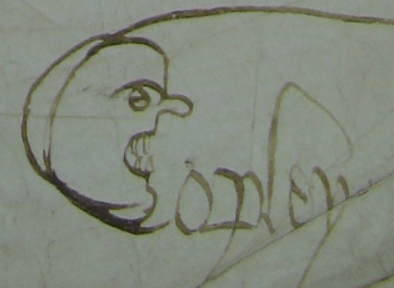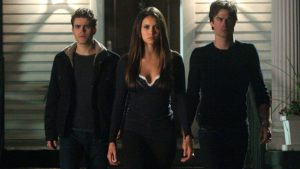- [This is an updated version of something I wrote in 2021, on vampires and property law]
I can’t believe that it has taken me until now to bring together two important themes in my life: Land Law (taught it almost my whole academic career) and vampire stories (Dracula, Buffy, more versions of Dracula, the Vampyre, Carmilla, even Twilight – despite Bella Swan). What is there to say about Land Law and Vampires? Well, it dawned (!) on me as I watched an episode of latest fun trashy binge-watch The Vampire Diaries, (no, not even mildly embarrassed … vampires are cool and sexy and fascinating, especially when not the tortured goody-goody type, and obviously beat werewolves any day) that there are lots of unanswered points (!) in relation to the Undead and their interactions with systems of property.
(Vampires outside a house …)
Can I come in?
Yes, that one. It’s a common ‘rule of the game’ that a vampire cannot come into a home unless invited. From the point of view of suspense and narrative, it’s great – because often the person in the house doesn’t know the stranger on the doorstep is a vampire, and we groan at the uninformed acquiescence (because there’s no idea of informed consent here, is there?) as the vampire gains freedom to enter at will. Also, there is the comedy potential of a vampire denied entry walking into an invisible barrier.
The Vampire Diaries makes great play of this, and there are certainly resonances for those of us involved in another area regarded as a little … undead … – Land Law. In series one, Damon (everyone’s favourite evil-but-good-but-evil vampire) and Alaric (slightly Harrison Ford-ish human with a magic ring – actually played by the bonehead boyfriend from another jurisprudential classic, Legally Blonde) banter about the rule, revealing that there are some doubts as to exactly who has the right to invite somebody in, in particular with regard to short term lets, motels etc. s.2 ep. 18 went totally for the Venn diagram overlap between vampires and Land Law, by having a conveyance of a house to (slightly drippy but alive and human) Elena, so that she could use her right to invite/refuse to keep out undesirable vampires, but let in her then paramour, Stefan (he of the tortured soul, frequently demonstrated by moping in a tight vest) and other vampire allies.
There is more right-of-entry-related fun in later series. Season 7, for example, goes for it in a big way. In episode 2, Lily, vampire mother of Stefan and Damon Salvatore, during an evil phase, keeps her sons out of the house by signing it over to a compelled Matt Donovan (a rather dim human) and making him refuse them entry. Thrillingly, there is talk of land registration (be still my apparently not undead beating heart)! And also a nugget on the workings of the whole thing – apparently if human Matt were killed and then brought back to life, that would simply ‘open the door’ – so, the seals would not go back up when he returned from the dead. [Issues of property entitlements, succession and return from the dead could, frankly, be fleshed out rather more …] Another human registered proprietor for the Salvatore house (for the same reason as Matt) is the compelled cleaner, Lucy (season 7 ep. 6). [I do wonder how to categorise the interests of Lily’s family in the house – un-life tenants?] Another house which features some property-based refusal of entry issues is the place Bonnie Bennett bought to keep drippy Elena’s coma-coffin, and wanted to use as a love nest for herself and dodgily accented vampire Enzo. In s. 8 ep. 11, Stefan (in an evil phase – keep up!) somehow managed to have title transferred away from Bonnie, thus allowing him to get in, shutting Enzo out and leaving the latter vulnerable to slaughter. I don’t claim any knowledge at all of the property law of New York, so don’t really understand how it is that the realtor has the ability to assume title of the property, but that is what happens (she is, of course, compelled – interesting to wonder how vampire compulsion could be brought up in a property dispute …)
Good stuff, but still so much that we need to know, e.g. …
To which buildings does the rule apply?
- The stories are mostly, if not all, about homes. So are commercial premises ruled out (along the lines of rules restraining mortgage repossessions etc.? And what of a ‘mixed use’ property? Vampire story writers, I encourage you to look up the case law on ‘dwelling house’ under the Administration of Justice Act 1973 s.8 (or equivalent in your jurisdiction).
- And what of static caravans? These might be regarded as chattels rather than fixtures. Does the rule apply?
Can we have a little more detail on the right to invite?
- Is legal title required before a person has the right to invite?
- Can one of two co-owners invite a vampire in? (This, shockingly, is not mentioned in the Trusts of Land and Appointment of Trustees Act 1996 – unless we consider it to come under ‘powers of an owner’. Surely it would be a breach of trust, though.)
- What about houses subject to a mortgage? Or a long leasehold? Could a vampire move in to one house and acquire an easement to enter neighbouring properties? How would a licence for vampire entry work with s. 62 of the Law of Property Act on reconveyance? So many unanswered questions …
- Given Manchester Airport v. Dutton [1999] EWCA 844, can a mere licensee invite a vampire in?
- What happens when the house is sold, or if the ‘inviter’ dies and the property passes to a donee? Is a new invitation required?
- Can conditions be placed upon an invitation?
- Does an invitation to a vampire to enter amount to severance of an equitable joint tenancy (as well as likely severance of a carotid artery)?
- Can vampires keep their own homes, i.e. the ones they had prior to being ‘turned’? This seems to be assumed, but why is it that they do not lose their rights on becoming technically dead, the right passing to the (living) person entitled under a will or intestacy, enabling that person to shut them out?
- Could a vampire ever be ‘in actual occupation’ for the purposes of Sch. 3 para. 2 of the Land Registration Act? It doesn’t specifically say that life is required …
- What happens if a vampire is granted a life interest in land?
- Could a vampire ever acquire an easement by prescription, or would it always fall down on the nec vi, nec clam, nec precario thing (since any prescribing would be done at night, with force, and possibly with (compelled/sneakily acquired) permission?
- Finally, bringing in Legal History as well … Given that the undead ‘live’ (exist? un-die?) rather a long time (as long as they avoid staking etc.), and that regimes of property law can change, how do we decide what is the correct set of Land Law rules to apply to all of this. Is the critical date that of the vampire’s turning, of the building of the house, or the current date? And where would any disputes be taken? I am sure there is a whole issue about standing of and jurisdiction over the undead which needs to be sorted out.
(Vampires clearly inside a house …)
There’s just so much we need to know, isn’t there? And very oddly, there is not much in the way of existing scholarship.[i] Too much other stuff to do at the moment, but, like the undead, my article on Vampire Property Law for the Mystic Falls Law Review is a project which will keep (as long as it avoids direct sunlight, decapitation, or a stake through the heart …)
GS
11/3/2021
updated 20/1/2022
(Main Image – what is very obviously a vampire, from an AALT scan of a Common Pleas roll of 1489: ‘vampires and legal history’ is a thing. Don’t get me started on ‘mortmain’ …)
[Later thought – on the basis of this case – surely there is scope for a bit of vampiring up of the legal/property aspects of cryptocurrency such as Bitcoin …. Yes, need to get out more …]
[i] Honourable exceptions in terms of general law/vampire study: Anne McGillivray’s ‘”He would have made a wonderful solicitor”: law, modernity and professionalism in Bram Stoker’s Dracula‘, in Lawyers and Vampires : Cultural Histories of Legal Professions, edited by David Sugarman, and W. W. Pue, (2004), c. 9; Anthony Bradney . ‘Choosing laws, choosing families: images of law, love and authority in “Buffy the Vampire Slayer” Web J.C.L.I. 2003, 2).


